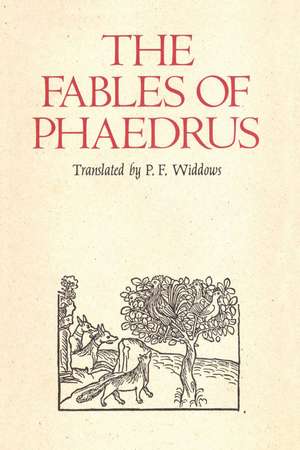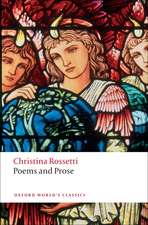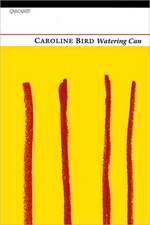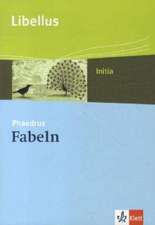The Fables of Phaedrus
Autor Phaedrus Traducere de P. F. Widdowsen Limba Engleză Paperback – feb 1992
In addition to the familiar animal fables, about a quarter of the book includes such diverse material as prologues and epilogues, historical anecdotes, short stories, enlarged proverbs and sayings, comic episodes and folk wisdom, and many incidental glimpses of Greek and Roman life in the classical period.
The Fables also sheds light on the personal history of Phaedrus, who seems to have been an educated slave, eventually granted his freedom by the emperor Augustus. Phaedrus' style is lively, clean, and sparse, though not at the cost of all detail and elaboration. It serves well as a vehicle for his two avowed purposes—to entertain and to give wise counsel for the conduct of life. Like all fabulists, Phaedrus was a moralist, albeit on a modest and popular level.
An excellent introduction by P. F. Widdows provides information about Phaedrus, the history of The Fables, the metric style of the original and of this translation, and something of the place of these fables in Western folklore. The translation is done in a free version of Anglo-Saxon alliterative verse, a form used by W. H. Auden and chosen here to match the popular tone of Phaedrus' Latin verse.
Preț: 166.47 lei
Nou
Puncte Express: 250
Preț estimativ în valută:
31.85€ • 33.26$ • 26.36£
31.85€ • 33.26$ • 26.36£
Carte tipărită la comandă
Livrare economică 05-19 aprilie
Preluare comenzi: 021 569.72.76
Specificații
ISBN-13: 9780292724730
ISBN-10: 029272473X
Pagini: 196
Ilustrații: Illustrations
Dimensiuni: 152 x 229 x 16 mm
Greutate: 0.45 kg
Editura: University of Texas Press
Colecția University of Texas Press
ISBN-10: 029272473X
Pagini: 196
Ilustrații: Illustrations
Dimensiuni: 152 x 229 x 16 mm
Greutate: 0.45 kg
Editura: University of Texas Press
Colecția University of Texas Press
Notă biografică
The translator, P. F. Widdows (1918–1997) was Professor of Classics at Concordia University in Montreal.
Cuprins
- Introduction
- BOOK 1
- Prologue
- Fable 1. The Wolf and the Lamb
- 2. The Frogs Ask for a King
- 3. The Presumptuous Jackdaw and the Peacock
- 4. The Dog Carrying a Piece of Meat across a River
- 5. The Cow, the She-goat, the Sheep, and the Lion
- 6. The Frogs Complain about the Sun
- 7. The Fox and the Tragic Actor’s Mask
- 8. The Wolf and the Crane
- 9. The Sparrow Gives Advice to the Hare
- 10. The Wolf and the Fox Receive Judgment from the Ape
- 11. The Lion and the Ass Go Hunting
- 12. The Stag at the Fountain
- 13. The Fox and the Crow
- 14. From Cobbler to Physician
- 15. What the Ass Said to the Old Shepherd
- 16. The Sheep, the Stag, and the Wolf
- 17. The Sheep, the Dog, and the Wolf
- 18. A Woman in Childbirth
- 19. The Dog and Her Litter of Puppies
- 20. The Hungry Dogs
- 21. The Old Lion, the Boar, the Bull, and the Ass
- 22. The Weasel and the Man
- 23. The Faithful Dog
- 24. The Frog Who Burst Himself and the Bull
- 25. The Dogs and the Crocodiles
- 26. The Fox and the Stork
- 27. The Dog, the Treasure, and the Vulture
- 28. The Fox and the Eagle
- 29. The Ass Insults the Boar
- 30. The Frogs Afraid of the Battle of the Bulls
- 31. The Kite and the Doves
- BOOK 2
- Author’s Prologue
- Fable 1. The Bullock, the Lion, and the Bandit
- 2. Two Women, One Old, One Young, in Love with the Same Man
- 3. Aesop’s Words to a Man about the Success of Wrongdoers
- 4. The Eagle, the Cat, and the Wild Boar
- 5. Tiberius’ Words to an Attendant
- 6. The Eagle and the Crow
- 7. The Two Mules and the Robbers
- 8. The Stag and the Oxen
- 9. The Author Speaks
- BOOK 3
- Prologue: Phaedrus to Eutychus
- Fable 1. What the Old Woman Said to the Wine Jar
- 2. The Panther and the Shepherds
- 3. Aesop and the Farmer
- 4. The Butcher and the Monkey
- 5. Aesop and the Impudent Fellow
- 6. The Fly and the Mule
- 7. The Wolf and the Sleek Dog
- 8. Brother and Sister
- 9. Socrates to His Friends
- 10. The Poet, on Believing and Not Believing
- 11. The Eunuch’s Reply to His Insulting Adversary
- 12. The Cock and the Pearl
- 13. The Wasp Adjudicating between the Bees and the Drones
- 14. On Play and Seriousness
- 15. The Dog and the Lamb
- 16. The Cicada and the Owl
- 17. The Trees under the Patronage of the Gods
- 18. The Peacock Complains to Juno about His Voice
- 19. Aesop’s Reply to the Joker
- Epilogue
- BOOK 4
- Prologue: The Poet to Particulo
- Fable 1. The Ass and the Priests of Cybele
- 2. The Weasel and the Mice
- 3. The Fox and the Grapes
- 4. The Horse and the Wild Boar
- 5. Aesop and the Enigmatic Will
- 6. The Battle of the Mice and Weasels
- 7. Phaedrus and the Critic
- 8. The Viper and the File
- 9. The Fox and the Goat
- 10. On the Faults of Men
- 11. The Thief and His Lamp
- 12. The Evils of Wealth
- 13. The Reign of the Lion
- 13A. The Reign of the Lion
- 13B. The King of the Apes
- 14. Prometheus
- 15. Prometheus Again
- 16. The Bearded She-goats
- 17. On the Fortunes of Men
- 18. The Dogs Send Envoys to Jupiter
- 19. The Snake Fatal to the Compassionate Man
- 19A. The Snake Fatal to the Compassionate Man
- 20. The Fox and the Dragon
- 21. Phaedrus
- 22. About Simonides
- 23. The Mountain in Labor
- 24. The Ant and the Fly
- 25. Simonides Saved by the Gods
- Epilogue: The Poet to Particulo
- BOOK 5
- Prologue: The Poet Again
- Fable 1. King Demetrius and the Poet Menander
- 2. The Two Soldiers and the Robber
- 3. The Bald Man and the Fly
- 4. The Ass and the Pig’s Barley
- 5. The Buffoon and the Countryman
- 6. The Two Bald Men
- 7. King, the Flute Player
- 8. Time
- 9. The Bull and the Calf
- 10. The Old Dog and the Hunter
- PEROTTI’S APPENDIX
- Fable 1. The Ape and the Fox
- 2. The Author
- 3. The Author
- 4. Mercury and the Two Women
- 5–6. Prometheus and Guile
- 7. The Author
- 8. The Author
- 9. Aesop and the Writer
- 10. Pompey and His Soldier
- 11. Juno, Venus, and the Hen
- 12. The Bullock and the Old Ox
- 13. Aesop and the Victorious Boxer
- 14. The Ass and the Lyre
- 15. The Widow and the Soldier
- 16. The Two Suitors
- 17. Aesop and His Mistress
- 18. The Cock and the Cats Who Carried His Sedan Chair
- 19. The Sow Giving Birth and the Wolf
- 20. Aesop and the Runaway Slave
- 21. The Race Horse
- 22. The Hungry Bear
- 23. The Traveler and the Raven
- 24. The Shepherd and the She-goat
- 25. The Snake and the Lizard
- 26. The Crow and the Sheep
- 27. Socrates and the Rascally Servant
- 28. The Hare and the Herdsman
- 29. The Courtesan and the Young Man
- 30. The Beaver
- 31. The Butterfly and the Wasp
- 32. The Ground Swallow and the Fox
Descriere
A translation of the earliest surviving Roman animal fables.















